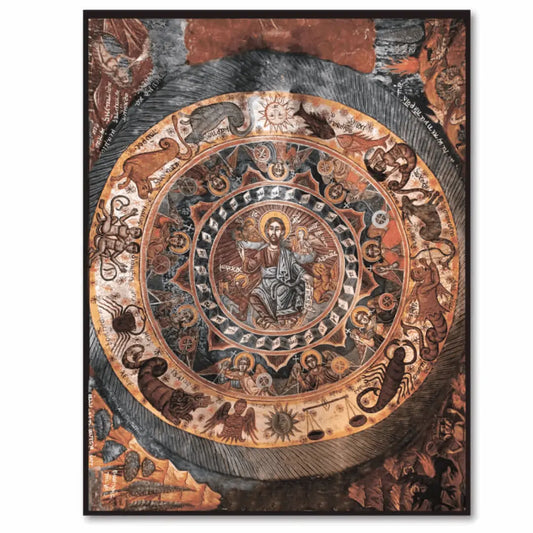Mother of God Virgin Mary the Theotokos of Iveron with the Apostles. Wooden orthodox icon
Mother of God Virgin Mary the Theotokos of Iveron with the Apostles. Wooden orthodox icon
Couldn't load pickup availability
Icon of the Mother of God of Iveron with Twelve Apostles
Saints in the fields: Archangels Michael and Gabriel, Twelve Apostles, John the Baptist, Basil the Great, John Chrysostom
The Iveron Icon of the Mother of God, the image of which is located on Athos, became famous for many miracles. The rumor about the miraculous image spread throughout Russia through pilgrims. His Holiness Patriarch Nikon (then still Novospassky Archimandrite) turned to the Archimandrite of the Iveron Athos Monastery Pachomius (who arrived in Moscow for alms for the Athos monasteries) with a request to send a copy of the miraculous Iveron Icon of the Most Holy Theotokos. The Athonite monk Iamblichus wrote a copy of the Iveron image, and a year later the icon, accompanied by Athonite monks, arrived in Moscow. On October 13, 1648, she was solemnly welcomed by the residents of the capital. The great shrine of the Russian Orthodox Church, the Moscow Iveron Icon, has been glorified by the Lord with many miracles.
The Iveron Icon (which is now kept on Mount Athos) in the 9th century was in the possession of a pious widow who lived near the city of Nicaea. Under Emperor Theophilus (829–842), iconoclasts who were destroying holy icons came to the house of this Christian woman, and one warrior struck the image of the Mother of God with a spear. Blood immediately flowed from the affected area. The widow, fearing the destruction of the shrine, promised the imperial soldiers money and asked them not to touch the icon until the morning. When they left, the woman, together with her son (later an Athonite monk), lowered it into the sea to preserve the holy icon. The icon, standing on the water, sailed to Athos. The Athonite monks, having seen a pillar of fire rising to the sky for several days in the sea, came to the shore and found a holy image standing on the water. After a prayer service for the donation of the shrine that had appeared to the monastery, the pious monk of the Iveron Monastery, Saint Gabriel the Gruzin (July 25), at the command of the Mother of God, who appeared to him in a dream, walked on the water, received the holy icon and placed it in the temple. However, the next day the icon was found not in the temple, but above the gates of the monastery. This was repeated several times until the Most Holy Virgin revealed Her will to Saint Gabriel in a dream, saying that she did not want to be kept by the monks, but wanted to be their Guardian. After this, the image was placed above the monastery gate, where it remains to this day. Therefore, the holy icon is called Portaitissa.
🖼 Product Features
• Printed on durable MDF wood panel
• Mineral pigment inks for long-lasting color
• Sealed with protective beeswax finish
• Ready to hang — includes mounted metal hook
• Handmade by Orthodox Christian artisans
• Lightweight yet solid: board thickness is 1.6 cm (0.6")
The icon has no recess, the surface is smooth.
📏 Available Sizes
• 12 x 15 cm (5” x 6”)
• 23 x 30 cm (9” x 12”)
• 30 x 39 cm (12” x 15”)
🎁 Perfect for
• Orthodox Christian gifts
• Spiritual housewarming gifts
• Prayer corners and devotional altars
• Baptisms, name days, and feast days
🌍 Ships worldwide with secure packaging
Our icons are made by Orthodox craftsmen in Portugal.
We hope it will be a good gift for you and your loved ones.
Share
Theological icons
-
The Holy Trinity by Andrei Rublev. Wooden orthodox icon
Regular price From $137.00 USDRegular priceUnit price / per -
Mother of God, the Theotokos — The Unassailable Door (The Impregnable Gate) icon
Regular price From $137.00 USDRegular priceUnit price / per -
Icon of the Last Judgement of God. Wooden orthodox icon
Regular price From $137.00 USDRegular priceUnit price / per -
The Trinity of the New Testament - Fatherland icon. God the Father, God the Son and God the Holy Spirit. Wooden orthodox icon
Regular price From $137.00 USDRegular priceUnit price / per -
Icon "Only-Begotten Son and Word of God" rare orthodox art
Regular price From $137.00 USDRegular priceUnit price / per -
Icon of the Crucifixion of Jesus Christ with saints Paisius the Great and Boniface the Martyr
Regular price From $137.00 USDRegular priceUnit price / per -
Icon of the Assumption of the Most Holy Theotokos – Orthodox Christian Icon
Regular price From $137.00 USDRegular priceUnit price / per -
Nativity of Jesus – Orthodox Icon of the Birth of Christ
Regular price From $137.00 USDRegular priceUnit price / per -
Orthodox Icon “Return of the Prodigal Son” | Christian Wall Art Repentance & Forgiveness Gift
Regular price From $137.00 USDRegular priceUnit price / per -
The “All-Seeing Eye of God” Orthodox Icon
Regular price From $137.00 USDRegular priceUnit price / per -
Mother of God Icon “The Unburnt Bush” Orthodox Fire Protection Icon Handmade Wooden Wall Art Theotokos with Angels and Evangelists
Regular price From $149.00 USDRegular priceUnit price / per -
Holy Family at Work Icon Physical Labor of Jesus, Mary and Joseph
Regular price From $137.00 USDRegular priceUnit price / per -


Christ Pantocrator Icon – Surrounded by Zodiac, Angels, and Evangelists 19th Century Orthodox Fresco
Regular price From $137.00 USDRegular priceUnit price / per -
Synaxis of All Saints with Gospel Feasts Orthodox Wooden Icon
Regular price From $137.00 USDRegular priceUnit price / per -
The Six Days of Creation (Hexaemeron) with Selected Saints. Wooden orthodox icon.
Regular price From $137.00 USDRegular priceUnit price / per
100%SECURED
SHIPPING
100%SATISFACTION
GUARANTEE
FREEWORLDWIDE
SHIPPING
30 DAYSRETURN
POLICY